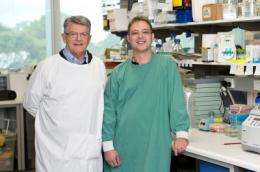Scientists discover a ‘handbrake’ for MS

(Medical Xpress) -- The progression of the debilitating disease Multiple Sclerosis (MS) could be slowed or even halted by blocking a protein that contributes to nerve damage, according to a new study.
In research published today in the journal Brain, scientists from the Monash Immunology and Stem Cell Laboratories (MISCL), the University of Toronto, Yale and the University of Western Australia, have demonstrated the key role played by the collapsin response mediator protein 2 (CRMP-2) in the development of MS.
Led by MISCL’s Dr Steven Petratos, also of RMIT University, and Professor Claude Bernard, the research team found that a modified version of CRMP-2 is present in active MS lesions, which indicate damage to the nervous system, in a laboratory model of MS.
The modified CRMP-2 interacts with another protein to cause nerve fibre damage that can result in numbness, blindness, difficulties with speech and motor skills, and cognitive impairments in sufferers.
When either the modified CRMP-2 or the interaction between the two proteins was blocked, using a method already approved in both the US and Australia, the progression of the disease was halted.
Director of MISCL, Professor Richard Boyd said the discovery could lead to new treatments for MS.
“Blocking the same protein in people with MS could provide a ‘handbrake’ to the progression of the disease,” Professor Boyd said.
Dr Petratos said the method used to block the protein was approved for the treatment of other disease conditions by both the US Food and Drug Administration and Australia’s Therapeutic Goods Administration.
“This should mean that clinical trials – once they start – will be fast tracked as the form of administration has already been approved,” Dr Petratos said.
MS Australia estimates that the disease affects more than 20,000 people in Australia, and up to 2.5 million worldwide. The disease tends to strike early in adulthood, with women three times more likely than men to be diagnosed. The total cost to the Australian community of the disease is estimated at $1 billion annually.
The research received major funding from the National Multiple Sclerosis Society of the United States of America and partial funding from MS Research Australia.















